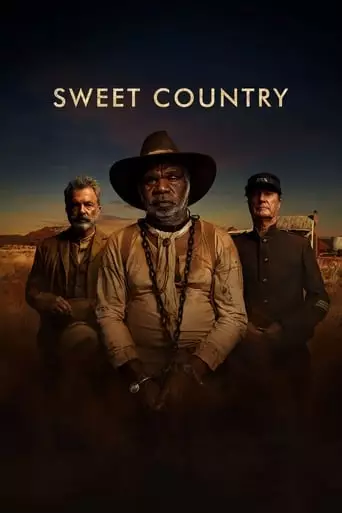
Sweet Country (2017) Watch Online Free
In 1929, an Australian Aboriginal stockman kills a white station owner in self-defense and goes on the lam, pursued by a posse.
Sweet Country is a 2017 Australian Western directed by Warwick Thornton, set in the Northern Territory during the late 1920s. The film follows Sam Kelly (Hamilton Morris), an Aboriginal man who works for Fred Smith (Sam Neill), a Christian farmer. Their lives are disrupted when Harry March (Ewen Leslie), a war veteran suffering from PTSD, arrives seeking help. March’s violent behavior leads to a tragic incident, prompting Sam and his wife, Lizzie (Natassia Gorey-Furber), to flee. A posse, led by Sergeant Fletcher (Bryan Brown), pursues them, leading to a tense exploration of justice and morality in a racially divided society.
Racial Injustice and Colonialism
The film starkly portrays the systemic racism faced by Indigenous Australians during the early 20th century. Through Sam’s experiences, it highlights the dehumanizing effects of colonialism and the pervasive discrimination that Indigenous people endured. The narrative underscores the brutal realities of a society built on racial hierarchies.
The Impact of War
Harry March’s character embodies the psychological scars of war. His PTSD manifests in violent outbursts, affecting those around him. The film explores how the trauma of war extends beyond the battlefield, influencing personal relationships and societal dynamics.
Justice and Morality
Sweet Country delves into complex questions of justice and morality. Sam’s act of self-defense against March raises ethical dilemmas, especially within a legal system that favors white settlers. The film critiques the concept of justice in a racially biased society, questioning who defines right and wrong.
Gender Roles and Power Dynamics
The film also examines the limited roles and power of women in this historical context. Lizzie’s character reflects the subjugation and resilience of women, particularly Indigenous women, who navigate both racial and gender-based oppression. Her experiences highlight the intersectionality of discrimination.
Sweet Country received critical acclaim for its unflinching portrayal of Australia’s colonial history and its impact on Indigenous communities. The film won the Jury Prize at the Venice Film Festival, recognizing its powerful storytelling and direction. Critics praised its cinematography and the depth of its social commentary. The film has been instrumental in sparking discussions about the representation of Indigenous stories in cinema and the ongoing legacy of colonialism in Australia.
After watching Sweet Country, viewers are likely to experience a profound sense of empathy and reflection. The film’s unflinching portrayal of racial injustice and moral complexity may evoke feelings of sorrow and indignation. Its emotional depth and powerful storytelling are likely to leave a lasting impression, prompting reflection on the complexities of human relationships and the enduring impact of societal structures. The film’s haunting imagery and poignant narrative may linger in your thoughts, encouraging a deeper understanding of the historical and contemporary issues it addresses.
